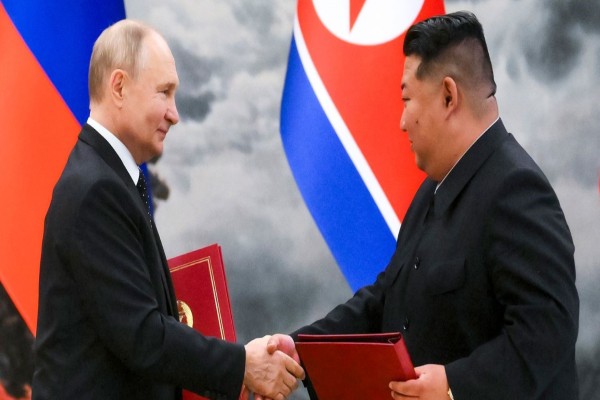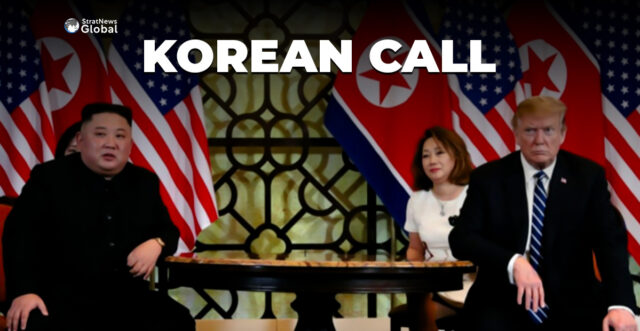We live in increasingly troubled times. The wars in Ukraine and West Asia, the turbulence in the Indo-Pacific region as China flexes its growing economic and military muscles, and the rising friction in the Korean peninsula could each easily spiral into a larger conflict, with major global repercussions.
Perhaps the least discussed –and the most troubling– is the alarming spike in hostilities between the two Koreas. Technically still at war, the Democratic People’s Republic of Korea (A totalitarian hereditary dictatorship and de facto nuclear weapons state currently ruled by Kim Jong Un) and its southern neighbour, the Republic of Korea run by President Yoon Suk Yeol, maintain an armistice that vacillates between shared dreams of unification and vitriolic threats of annihilation.
The significant involvement of three de jure nuclear powers, the People’s Republic of China, the Russian Federation and the United States in the peninsula adds another layer of volatility to the situation.
Which begs the question: is the region really on the brink of war? Or will the occasionally erratic but essentially mainly durable stalemate persist?
Current tensions are high: Russia has reinvigorated its relationship with the DPRK (also known as the Hermit Kingdom), valuable for its efforts against Ukraine while it provides the DPRK with nuclear and satellite technology. And despite occasional bouts of tension, the PRC maintains strong political and economic ties with the Hermit Kingdom.
The U.S., on the other hand, has supported the ROK for the past 75 years.
The conflicting interests and tensions and the massive firepower involved suggest that a low-level provocation or miscalculation might explode into a regional or even a global conflict.
However, outward appearances can be deceiving. In traditional geopolitics, pragmatic self-interest reigns, and the Korean Peninsula is not immune to the centrifugal forces which have driven International Relations since its inception.
Despite appearances, all stakeholders on the Peninsula actually share a common goal: maintaining the status quo. Although this may seem to go against each nation’s interests, an analysis shows that each has something to gain from it. Let’s start with the DPRK and its 1950 invasion of the ROK.
THE KOREAN WAR
“We will have no hesitation in annihilating (South Korea) by mobilising all means and forces in our hands.”
–DPRK Supreme Leader Kim Jong Un (KJU)
While many consider the Hermit Kingdom an enigma, the driving force behind KJU’s decision is not; regime survival remains the foundational priority upon which all else rests, just as did for KJU’s father and grandfather.
Correspondingly, resources monopolised by protecting the regime (for example, nuclear weapons) mean less funds for domestic issues, most notably the rising number of North Koreans struggling to feed themselves. To keep the masses focused on supporting KJU and not thinking about their empty stomachs, long working hours and captivity in an Orwellian-inspired surveillance state, the regime trumps up the threat from the U.S. and the ROK.
This falsified illusion of a perpetually imminent threat against DPRK enables KJU to demand great sacrifices from his domestic audience, from elites in Pyongyang, but mostly from workers in the factories and fields. Without that threat, KJU no longer has a credible rationale for the poor living standards of most North Koreans. The regime brooks no dissent from the elites, the generals and the rest. With the added benefit of playing the PRC and Russia against each other, stalemate best serves DPRK interests.
THE VIEW FROM BEIJING
“No country has the right to dominate global affairs, control the destiny of others, or keep advantages in development all to itself.”
–President Xi Jinping
While the PRC has privately lamented its troublesome “spoiled child” to its south, the DPRK provides strategic depth for the Chinese Army (PLA), which prevents a hostile country on its border. The benefit of its useful idiocy outweighs the costs in this relationship. Most agree that an attack by the DPRK on the ROK spells the end of the KJU regime; consequently, the PRC prefers the status quo that best serves national interests.
A slowing economy and a military that most experts consider not ready for large-scale combat operations (LSCO) against a peer adversary strengthen Beijing’s preference for the status quo.
PUTIN’S POINT

“This is why we’ve come to Vostochny Cosmodrome.”
President Vladimir Putin, when asked if Russia would help North Korea build satellites.
Similar to the PRC, Russia would be uneasy sharing a border with a pro-US ROK government, making the DPRK slightly more than a useful idiot in the eyes of Moscow. Consequently, maintaining the status quo best serves Russian interests. Additionally, the presence of the U.S. military in the region gives Moscow justification to interfere with the PRC’s relationship with the DPRK while challenging Chinese and American hegemonic aspirations in the region.
Much like the PRC, Russia’s greatest ally is itself. Consequently, Russian interests prefer a status quo, which allows it to check its rivals without committing to significant diplomatic, economic or military obligations, most consumed by its ill-advised decision to invade Ukraine.
THE SOUTH KOREAN POSITION
“The structure of the trilateral cooperation among South Korea, the United States and Japan will become more solid as North Korea’s provocation and threats increase.”
–South Korean President Yoon Suk Yeol
Seoul’s proximity to the DPRK all but assures it would be devastated by a preemptive strike. Recovery would be difficult with assistance, let alone without it. Logically, a better course of action is to keep matters with the DPRK within competition and the occasional crisis, but not conflict.
To this end, the status quo plays a pivotal role. Without question, the U.S. presence is a massive deterrent to the DPRK. It comes at a fraction of the cost for the ROK compared to replicating a similar capability on its own. A U.S. exit is a potential triple blow to the ROK. It loses the protection of U.S. deterrence while becoming more vulnerable to the DPRK’s military and of course the PRC’s influence.
The status quo sidelines all three issues. Reunification or peace does not change Seoul’s calculus; the former would require trillions of dollars to integrate the DPRK’s ‘economy’, while the latter could necessitate a U.S. exit and the political, economic and military advantages it provides. These considerations make the ROK another state that benefits most from keeping the geopolitical environment in its current incarnation.
AMERICA’S OPTIONS
“We must not forget that Korea is not at peace, and Eighth Army remains prepared to Fight Tonight.”
–U.S. 8th Army Mission statement
With China seen as its pacing threat, the ongoing tensions with DPRK offer justification for the large U.S. military footprint in the region, specifically the South China Sea. While these forces are positioned to support the ROK, a more pressing purpose is deterring Chinese aggression.
The elimination of the DPRK threat makes it much more difficult for any U.S. President to justify a large and expensive U.S. military presence in the region. This becomes more problematic if it coincides with election cycles in the U.S. Conversely, an entrenched status quo perpetuates the heightened American commitment to the region. A tense status quo demands a well-equipped American presence.
“We can’t afford to lose all that we’ve built from the ashes of the Korean War.”
–Moon Jae-in, Former President, Republic of Korea
The current environment offers a “Goldilocks zone” for the parties in play; a perpetual state of tension that occasionally spikes but never spills into conflict while preserving a status quo that favours all parties.
But what could shatter the status quo and launch all into the abyss? The DRPK’s voracious pursuit of more capable nuclear forces all but rules out foreign intervention; it is difficult to imagine a scenario in which the ROK or the U.S. risk war against the DPRK. An internal threat to the KJU regime is more likely to be a catalyst for the unthinkable. In such an occurrence, KJU detects dissent from two crucial internal sectors: the military and civilian elite.
Desperate to stave off a challenge to his family’s grip on power, KJU invents a rationale for attacking the ROK, such as a cross-border false flag event. With the DPRK’s propaganda at full throat, those who contest the call to arms are accused of a lack of patriotism at the very least and outright treason at worst. KJU can then marshal domestic support while having a justification for purging enemies within the military leadership and the elites.
But the intricacies of such a scheme bear the frightful risk of miscalculation at least, nuclear war at worst. Given the inherent complexity and risk, this course of action also remains unlikely. Much more likely, with history as supporting evidence, the status quo retains the sturdy qualities it has honed over the past fifty years, much to the quiet delight of decision-makers in Pyongyang, Beijing, Moscow, Seoul and Washington.
Major Rocco P. Santurri III is a Foreign Affairs consultant, freelance author, and part time American football coach.
Siddhant Hira is 2024 Non-resident Fellow, Irregular Warfare Initiative (U.S)
Rocco is a Foreign Affairs consultant, freelance author, and part time American football coach.
Siddhant Hira is a 2024 Non-resident Fellow, Irregular Warfare Initiative (U.S.)





